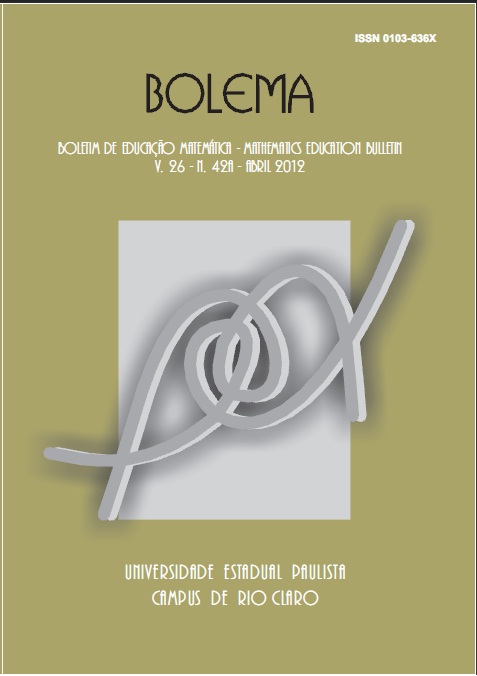<b> A Aprendizagem Matemática em uma Posição de Fronteira: foregrounds e intencionalidade de estudantes de uma favela brasileira</b>
Resumen
Resumo Nas grandes metrópoles, estudantes de diferentes bairros podem experimentar oportunidades de vida muito diferentes, o que pode influenciar suas atitudes em relação à escola e à aprendizagem, incluindo a aprendizagem da matemática. Entrevistamos umgrupo de seis estudantes de uma favela em uma grande cidade do interior do estado de São Paulo, Brasil, pedindo para que olhassem para o seu futuro e refletissem sobre se poderiam ter ou não motivos para aprender a matemática escolar, tanto em termos das profissões a que visavam quanto em relação à possibilidade de ascender ao ensino superior. Nos relatos desses estudantes identificamos alguns temas. O primeiro deles foi discriminação. Os estudantes se sentem discriminados devido ao fato de virem de um bairro pobre, e receiam estar rotulados segundo algum estereótipo. O segundo tema foi fuga. Há uma forte motivação para iniciar uma nova vida longe da favela. O terceiro tema diz respeito à obscuridade da matemática. Embora pareça claro a esses estudantes que a educação é relevante para assegurar uma mudança na vida, as aulas de matemática não parecem proporcionar qualquer indício a respeito de sua importância. O quarto tema é incerteza a respeito do futuro. Ao mesmo tempo em que aspiram a condições específicas, a realidade lhes apresenta grandes limitações. Neste artigo introduzimos um sistema teórico para discutir a relação entre as condições de vida dos estudantes da favela em relação às suas experiências e oportunidades educacionais. As intenções de aprendizagem dos estudantes estão relacionadas com seus foregrounds, ou seja, ao que eles percebem como sendo suas possibilidades futuras a partir de seu ambiente social. Os estudantes em uma favela vivem no que chamamos de posição de fronteira, um espaço no qual indivíduos conhecem seu ambiente social e chegam a um acordo face às múltiplas escolhas que a diversidade cultural e econômica torna disponíveis para eles. Palavras-chave: Posição de Fronteira. Foregrounds. Intencionalidade. Discriminação. Obscuridade da Matemática. Incerteza com Relação ao Futuro. Learning Mathematics in a Borderland Position: students’ foregrounds and intentionality in a brazilian favela Abstract In a large metropolis, students from different neighbourhoods can experience very different life opportunities. This can influence their attitude towards schooling and learning, including the learning of mathematics. We interviewed a group of six students from a favela in a large city in the interior of the state of São Paulo in Brazil. We invited the students to look into their future and explore whether or not there could be learning motives that linked mathematics in school to possible out-of-school practices, either in terms of possible future jobs or further studies. We identified some themes in the students’ descriptions of their experiences. The first theme is discrimination. The students feel discriminated against due to the fact that they come from a poor neighbourhood. They fear being trapped in some stereotypes. The second theme is escape. There is a strong motivation to begin a new life away from the favela. A third theme concerns the obscurity of mathematics. It seems clear to everybody that education is relevant to ensure a change in life. However, the mathematics lessons do not provide any clues regarding how mathematics might function is this respect. The fourth theme is uncertainty with respect to the future. The students could easily formulate almost unattainable aspirations,while reality might impose some very heavy limitations. In this article we introduce a theoretical framework for discussing the relation between favela students’ life conditions in relation to their educational experiences and opportunities. Students’ intentions for learning are related to their foregrounds, that is, how they perceive their future possibilities, as made evident to them by their social environment. Students in a favela could experience what we call a borderland position, a relational space where individuals meet their social environment and come to terms with the multiple choices that cultural and economic diversity make available to them. Keywords: Borderland Position. Students’ Foreground. Intentionality. Discrimination. Obscurity of Mathematics. Uncertainty with Respect to the Future.
Descargas
Publicado
Número
Sección
Licencia

>>>>> BOLEMA: Mathematics Education Bulletin = BOLEMA: Boletim de Educação Matemática, Rio Claro, SP, Brasil - eISSN 1980-4415 - está licenciado sob Licença Creative Commons


